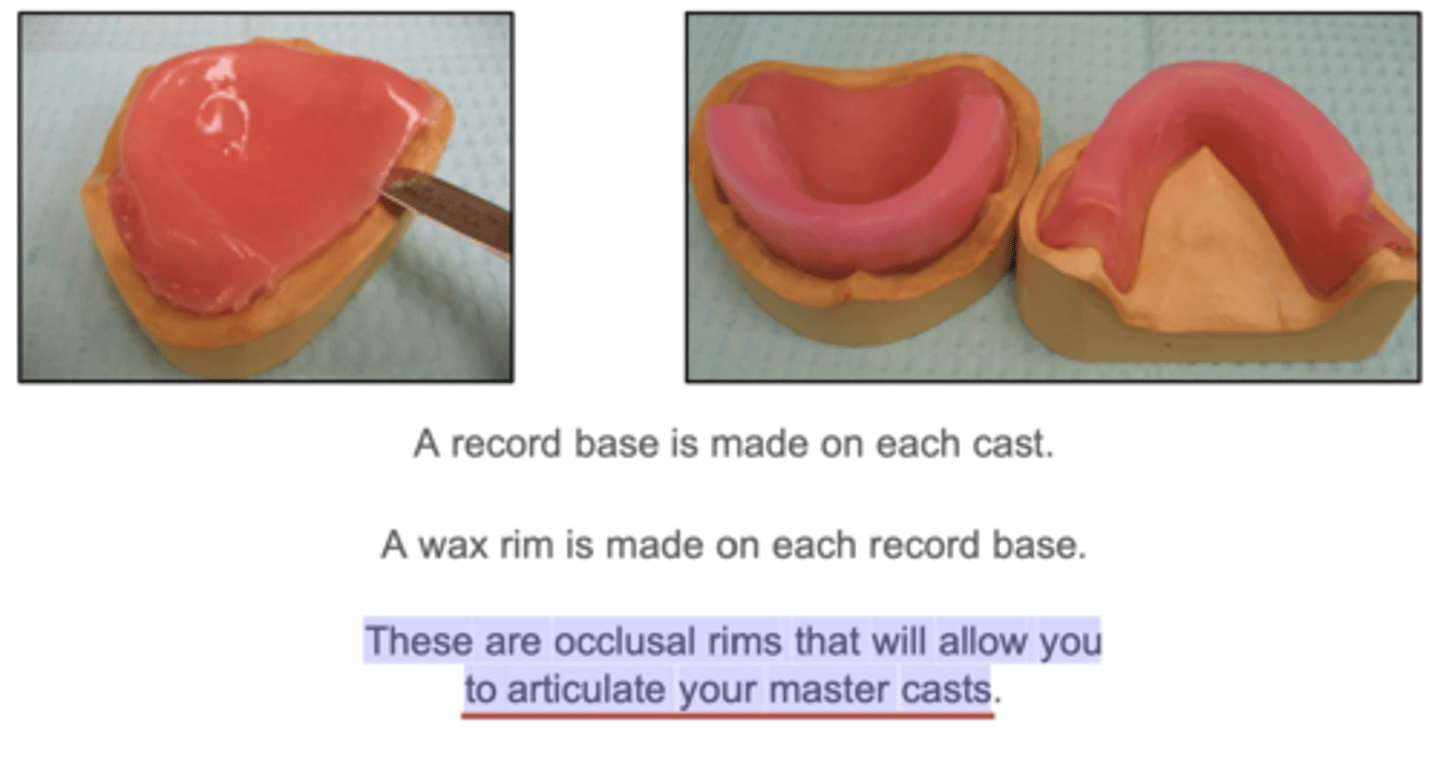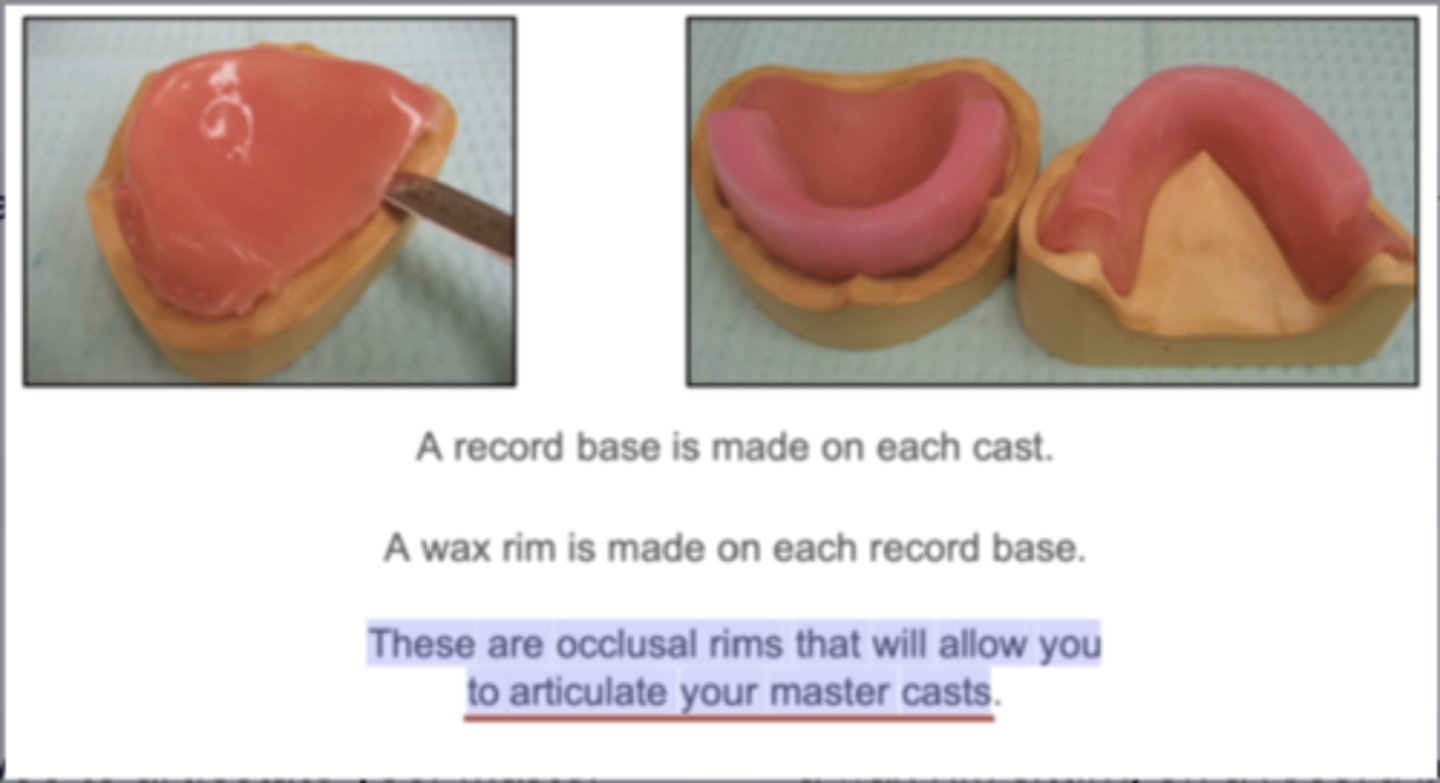thompsonleslie0 D2 | Complete Denture | Marking the master casts, record bases and wax rims
1/48
There's no tags or description
Looks like no tags are added yet.
Name | Mastery | Learn | Test | Matching | Spaced |
|---|
No study sessions yet.
49 Terms
Between which appointments are casts marked and record bases and wax rims fabricated?
Between 2nd and 3rd appointments
what is the purpose of making a record base on each cast and a wax rim on each record base?
These are occlusal rims that will allow you to articulate your master casts

what are the occlusal rims that will allow you to articulate your master casts?
a wax rim sitting on a record base that sits on the master cast

why do we mark the cast?
We mark the casts in order to create guidelines for the proper placement of the denture teeth in a complete denture set-up.
What determines the proper height, width and contour for the final complete denture?
Ideal border molding
How is the maxillary cast marked?
1.) Outline the incisive papilla
2.) Identify the center of the papilla
3.) Place a transparent ruler at the posterior edge of this mark and make the front edge perpendicular to the mid-palatal suture. Draw lines on the left and right edge of the ruler right under the ruler.
4.) Mark posterior to the hamular notches
5.) Identify and mark the fovea palatine
6.) Mark the mid-palatal line
7.) Mark the ridge crests
8.) Mark the buccal and labial frenum attachments
9.) Extend the ridge crests to the land area of the casts
10.) Extend the mid-line to the back of the cast
11.) Connect the hamular notches and fovea palatine and mark the glandular pocokets
How is the mandibular cast marked?
1.) Identify the retromolar pad and place a dot at the anterior 2/3 of the height of it of it. Extend lines laterally onto the left and right borders of the cast (landing area)
2.) Mark the crest of the residual ridge.
- Hold the straight edge of your transparent ruler over the crest of the ridge
- With the ruler, mark a pencil line on the posterior land area (A) that lines up with the anterior aspect (B) of retromolar pad
- Place a pencil line on the anterior land area in line with the straight edge of the ruler, then repeat on opposite side
3.) ascent of the rami
- Where the ascending rami begin, draw vertical lines on the left and right sides of the cast..
- No tooth will be set completely distal to this line.
4.) location of the anterior ridge
- Hold your ruler over the crest of the anterior aspect of the ridge and make it perpendicular to the midline.
- Draw pencil lines on the left and right land areas in line with the front edge of the ruler.
- Knowing the location the anterior ridge crest is always useful.
are there teeth set distal to the ascent of the rami?
NO tooth will be set completely distal to this point
how do you determine the bucco-lingual placement of teeth in the mandibular arch?
The central fossae of the premolar and molar denture teeth are placed directly over the crests of the mandibular residual ridges.
how do you find the crest of the residual ridge in a mandibular cast?
Identify the anterior aspect (the point) of the retromolar pads.. The crest of the ridge will always extend anteriorly from this point.
the anterior 2/3 of the retromolar pad is also the location of what?
the posterior aspect of the occlusal plane
why do we mark the retro-molar pads?
We mark the retromolar pads in order to determine the height of the posterior occlusal plane in a complete denture set-up
- The location of these dots or reference points is now transferred/ marked on the side of the casts.
- These transfers/markings should be done while holding the mandibular cast at eye level and looking at the cast from the facial aspect.
when marking the retromolar pads, how should they be held?
while holding the mandibular cast at eye level and looking at the cast from the facial aspect.
Where are undercuts typically found on the maxilla and mandible?
Maxilla: right and left sides in the anterior areas and above both tuberosities posteriorly
Mandible: Labial aspect and both retromylohyoid areas
What happens before and after undercuts are blocked in pre-clin? Clinic?
The casts are soaked in water. In pre-clin, vaseline is applied to the cast. In clinic, separating liquid is applied to the cast.
Where should the Triad material extend on the cast?
Into the peripheral rolls, but areas of frenum attachment should be notched out.
In clinic, when adapting the Triad material to the cast, where should it be slightly thinned and expose the cast?
Labial to the crest of the ridge, the insicive papilla should be exposed.
ideal border molding determines the proper....
height, width and counter of the final complete denture
the triad material should completely fill..
the entire peripheral rolls of your final edentulous casts
what are features of the maxillary wax rim?
- parallel to the mean foundation plane
- wax rim should have a slight anterior inclination
- at the lateral incisors (anteriorly), wax rim should be 22mm long
- incised area of the wax rim should be smooth, flat and 3mm wide
- lingual wax smooth and sloped toward the midline (posteriorly) and palate (anteriorly)
- 5mm wide in the bicuspid area, 10mm wide in the molar area
- 45 degree angle cut in posterior ends of wax rim where you would expect the junction of the 1st and second molars to be
what are features of the mandibular wax rim?
- anterior wax 18mm high and 3mm wide
- occlusal plane parallel to the mandibular mean foundation plane
- labial wall of mandibular wax rim is straight up and down w/ no buccal inclination
- The height of the anterior aspect of the mandibular wax rim, measured in the lateral incisor area is 18 mm
- The inciso-occlual surfaces are centered over the crest of the mandibular residual ridges
- The facial and the lingual wax surfaces slope from the inciso-occlusal surface down to the facial and lingual peripheral rolls
In clinic, where should Triad material be cut on the mandibular cast?
It should be cut to exposed the areas blocked out on the lingual surface.
How long should Triad material be cured?
2 minutes on the cast, 6 minutes off of the cast, upside down
At which position should the carousel of the Triad curing machine be set?
At the lowest position
Doing what to the most posterior aspect of the maxillary cast helps minimize acrylic shrinkage?
Thinning about 10 mm to half of its original thickness
How much space should be between the posterior edge of the maxillary cast and its record base?
No more than 2 mm
Which bur should be used to smooth the edges of the record bases?
Pineapple acrylic bur
How should record bases be marked for thinning of acrylic?
1.) Draw outlines on both bases lingual to and about 3 mm below the crests of the anterior ridges
2.) Extend these lines laterally to the first bicuspid areas on each side and draw lines anteriorly over the ridge crests
3.) Draw lines facially, connecting the side lines, which are 3 mm above the edge of the labial edges of the bases
4.) Thin unter paper thin
Describe the fabrication of wax rims.
Describe from pre-clin procedure
What are the height and width guidelines of maxillary and mandibular wax rims?
22 and 18 mm
3, 5, and 10 mm
How much of an anterior inclination is required for maxillary wax rims?
15 degrees
When trimming the casts, how should the base relate to the mean foundation plane?
They should be parallel. the occlusal plane should also be parallel to the MFP.
Where should the wax rims be placed?
over the crest of the residual ridge
Ascending Rami
Vertical lines marking limits for tooth placement.
Anterior Ridge
Location for anterior ridge crest marking.
Pink Triad VLC Material
Material used for record base fabrication.
Vaseline Coating
Prevents adhesion on impression surfaces.
Maxillary Record Base Adaptation
Process to fit Triad material on cast.
Curing Process
Involves two stages: 2 minutes, then 6 minutes.
Mandibular Record Base Fabrication
Cut trapezoidal pieces for left and right sides.
Maxillary Wax Rim Specifications
Height: 22mm, Width: 3mm, inclines anteriorly.
Mandibular Wax Rim Specifications
Height: 18mm, Width: 3mm, straight labial wall.
Polishing Procedure
Smooth surfaces with cold soapy water.
Peripheral Roll Filling
Ensures complete coverage in denture borders.
Final Adjustments
Verify measurements and ensure proper fit.
Tooth Positioning
Critical for optimal denture function.
Border Molding
Technique for achieving accurate denture edges.
Smooth Sloping Surfaces
Feature of maxillary wax rim design.
Trapezoidal Pieces
Used for mandibular record base construction.